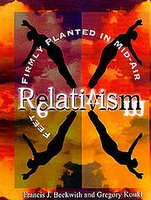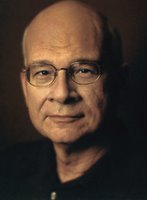 Pop Goes Postmodernism
Pop Goes Postmodernism
(By Michael Horton)
An advertisement has appeared in a number of evangelical magazines for yet another Bible translation. Looking smart and sophisticated, a woman stares intently at the reader. The caption reads, "If you want to attract me, you'd better watch your language." The ad goes on to relate how busy this young professional is these days, so the Bible needs to be suitably tailored to her lifestyle. In many respects, this captures the mood of mission these days: unswerving devotion to the adage that the customer is king. Furthermore, this woman is treated as the definitive norm and rule for ministry in a postmodern era. Are we postmodern? Should we be?
Naming "Postmodernism"
What is "postmodernism"? It depends. To an architect, sculptor, painter, or novelist postmodernism often refers to the specific artistic movement that reacted against the International Style and High Modern art and literature. To political theorists, it can refer to the end of utopian ideologies. To philosophers, it usually signals a transition away from a particular way of thinking about what we know and how we know that it is called "Cartesian foundationalism." And to economists, it may mean the shift from an industrial-age economy to an information-age economy in capitalism's current global phase. (For more on some of these uses of the term postmodernism, see D. A. Carson's article in this issue.)
Many now breathlessly announce that we have entered a postmodern age. Yet few are willing to pause and define how the term postmodernism is being used. Most often, it is just a code word for something new, for a supposed break with the past and the dawn of a radically new era. Of course, given that the word modern means what is new, a more modern description of an era could hardly be sought. In many ways, much of postmodernism is little more than "most-modernism." For instance, it was the modern philosopher Immanuel Kant (1724-1804) -- and not postmodern philosophers Jacques Derrida (b. 1930) or Richard Rorty (b. 1931) -- who introduced the view that the "world" conforms to the knower's conceptual categories rather than vice versa. There is just too much of the modern in the postmodern to be able to speak in sweeping terms of a major paradigm shift in culture.
Suffice it to say for our purposes that there are two over-arching types of postmodernism: academic and popular. There is great variety among the former. On a host of points that we cannot pursue here (namely, notions of tradition, language, the critique of autonomy, progress, presence and absence, etc.), thinkers generally classed as postmodern in the academy today have a lot to teach us about the very dangers that so many popularizers of postmodernism embrace. Remarkably fruitful discussions and debates abound in these deep waters and I find myself among those who enjoy wading in them.
There is also great variety among the popular versions of postmodernism, but I cannot bring myself to acknowledge that they are either sufficiently distinct from modernism or that they are sufficiently coherent to place under one label. Much has changed since the storming of the Bastille and the invention of television, some of it for the better and some of it for the worse. But pop-postmodernist cheerleading for the idea that we have entered a radically new era -- a utopia of unprecedented opportunity -- fails to move me. This is not because I am a stodgy conservative. I just do not believe the hype. I think every historical period has its pluses and minuses. Typecasting them just leads to knee-jerk demonization or equally impulsive lionization, making it hard to conduct cost-benefit analyses in particular cases. History and Scripture remind us that no era can be regarded as either an unmixed blessing or an unmixed curse. Human sinfulness and God's common grace coincide throughout the ages between the fall and the consummation. Knee-jerk conservatism and breathless progressivism can both become cop-outs for serious evaluation.
Call me dismissive, but I cannot get beyond the notion that pop postmodernism is little more than the triumph of popular culture with its obsessions with technology, mass communications, mass marketing, the therapeutic orientation, and conspicuous consumption. Postmodernism -- or whatever one wishes to designate our brief moment in history -- is the culture in which Sesame Street is considered educational, "sexy" is the term of approbation for everything from jeans to doctoral theses, watching sit-coms together at dinner is called "family time," abortion is considered "choice," films sell products, and a barrage of images and sound bites selected for their entertainment and commercial value is called "news." This easily translates into hipper-than-thou clubs passing for youth ministry, informal chats passing for sermons, and brazen marketing passing for evangelism, where busyness equals holiness and expository preaching is considered too intellectual. It can account in part for homes where disciplined habits both of general domestic culture and of instruction in Christian faith and practice give way to niche marketing and where churches become theaters of the absurd.
If modernity is pictured as the crusty tyrant, wrinkled with the fatigue of old age and faded dreams, postmodernism's visage is that of a child who refuses to grow up and accept the challenges as well as the opportunities of wisdom, truth, righteousness, and having responsibilities as well as having a good time. Stated in such intentionally simplistic terms, one can hardly distinguish postmodern from boomer -- that post-war generation that has been so aptly described by David Brooks, in his Bobos in Paradise: The New Upper Class and How They Got There, as one who insists on having his cake (the fruit of hard labor and genuine community) and eating it too (absolute freedom of individual choice).
This take on postmodernism is hardly new. Marxist intellectual Alex Callinocos's illuminating analysis of postmodernism concludes that it is little more than the result of the self-obsessed flower children of the revolutionary sixties now taking their place in the professional new middle class. In other words, postmodernism and boomer go hand-in-hand. There is no epochal change in Western culture, Callinocos insists. "Moreover, much of what is written in support of the idea that we live in a postmodern epoch seems to me of small caliber intellectually, usually superficial, often ignorant, sometimes incoherent."
Fatalism or Reformation?Callinocos's appraisal fits perfectly with what I see in contemporary Evangelicalism. In contemporary Evangelicalism, postmodernism is the new code word for mission, a new way of enforcing not just change but particular changes that involve particular ideological assumptions. There is even a note of fatalism in these challenges that verges on bullying: "Get with it or get left behind." This is just the way things are now, so we had better adapt.
If a church still thinks that the means of grace appointed by Christ as the Lord of his church are sufficient for the conversion of sinners and the edification of the saints, then critics must show from Scripture why this is not still true although we have reached the dawn of space travel. Why must change in the faith and practice of Christians parallel change in technology? Is there any relevant connection between the patterns of ministry established in Scripture and the surrender of dial-up providers to broadband Internet? If there is, then I fail to see it.
Superficial appeals to "our postmodern era" too easily cause us to capitulate before that worst of all threats: obsolescence. Frank Kermode calls postmodernism "another of those period descriptions that help you to take a view of the past suitable to whatever it is you want to do." This is like references to the "Dark Ages," which -- in spite of their wealth of discoveries, advancing technologies, the founding of universities, and so forth -- were effectively nicknamed by the scions of the Renaissance. They thereby sold subsequent generations on the spin that they were in fact breathing new life into Western civilization.
In contemporary Evangelicalism, psychological categories overwhelm confessional ones; managerial models of ministry outstrip the pastoral; categories of consumption, sometimes brazen and at other times indirect, reign over a more discipleship-oriented paradigm. Furthermore, ministers are constantly told these days that they must be market-driven rather than product-driven. The pragmatic takes precedence over the deliberative, autonomy over authority, the individual over the community, and the new and improved over the tried and tested. All of these trends have their roots in modernity, even if pop postmoderns have uncritically embraced them.
It is not so much the modern versus the postmodern but the total capitulation to pop culture that John Seebrook identifies as "the culture of marketing and the marketing of culture." Evangelicals obsessed with family values in a vaguely moral context often reflect the opposite values in the practice of their faith as niche marketing breaks up the generations, entertainment drowns out catechesis, and the attraction of the customer edges out the communion of saints across all times and places -- and I am just talking about evangelical attitudes about what should happen in the youth group!
Pop postmodernism today assumes that "is" implies "ought"; that "the way things are" is itself neutral, benign, or perhaps even an unmixed blessing. We do not take the trouble to analyze the ways in which, for example, the culture of marketing is fraught with peril for both culture and church, because being "cutting-edge," "effective," "successful" -- or, in more pious terms, "missional," simply requires it.
C. Peter Wagner argues, "Traditional church models no longer work in our fast-changing world. A commitment to reaching the lost is driving new apostolic churches to find new ways to fulfill the Great Commission." In this outlook, "our fast-changing world" -- what the Bible identifies as this fading age -- becomes the norm and church models are viewed in thoroughly relativistic terms, as if the Lord had left the twenty-first century church to find "ways to fulfill the Great Commission" other than Word and Sacrament. Just how does a faith that is passed down "from generation to generation" survive being marketed by a pop culture that declares, "This is not your father's Oldsmobile"? According to George Barna, it is "critical that we keep in mind a fundamental principle of Christian communication: the audience, not the message is sovereign." Is this the same evangelical movement that castigated the World Council of Churches for its slogan, "The church follows the world's agenda"?
A Different TypologyWhat if, instead of adopting the division of history into "modern" and "postmodern" in our evangelism and outreach, we followed the New Testament distinction between "the present evil age" and "the age to come" or between life "in the flesh" and "new life of the Spirit"? Jesus and Paul drew these contrasts (see Luke 18:30; Rom. 7:5-6; 8:5-9; Gal. 1:4). No matter what generation is currently rising, its members belong either to "this passing age" or to "the age to come." In fact, a good mark of being "conformed to this world" rather than being "transformed by the renewal of [our] mind" (Rom. 12:2) is that we think of ourselves and our generation "more highly than [we] ought" (v. 3).
Every generation since the Fall (just think of Cain's proud city and Babel's tower) has sought to "conspire against the Lord and against his anointed" in spite of God's declaration that he has "set [his] king on Zion, [his] holy hill" (Ps. 2:2, 6). Neither modernity nor postmodernity comes out a winner in that contest. To all our kings and kingdoms -- read, the "experts" and the imaginary "generations" that they have created for niche marketing -- the King in heaven still laughs, charging all those who pride themselves in breaking their chains to "Kiss the Son, lest he be angry, and you perish in the way, for his wrath is quickly kindled" (see Ps. 2:4, 12). Whether modern or postmodern, the truth is that "the present evil age" is fading away and the truly new age that is dawning is the kingdom that comes down from heaven in the glory and power of Christ's resurrection. "Blessed are those who take refuge in him" (Ps. 2:12).
If "the age to come" is breaking into even "the present evil age" through the preaching o

f the cross and resurrection, we really are in the presence of the One who has the power to disrupt our vain plots, to "rescript" us and take us "nowhere" people -- we "aliens and strangers" -- and give us a place around the Lamb's table with Abraham and his children from every time and place. No longer confined to the narrow vision of the modern or the postmodern, we are "raised... up with [Christ] and "seated... with him in the heavenly places" (Eph. 2:6) from where we announce the new creation that has appeared in these last days. For those who have been filled with God's Spirit there is no need to be bullied by the spirit of this age, whatever its form.
The agenda of the church in postmodernity is its task in every age: to tell the story, be written into it ourselves through Word and Sacrament, and to live that story in the power of the Spirit who incorporates us into its unfolding plot. Thus are we made participants in and living witnesses to the in-breaking age-to-come that relativizes all of our failed plots, all of our ages, and all of our eras, as they spin out under the sun.
Michael Horton (Ph.D., Wycliffe Hall, Oxford, and the University of Coventry) is associate professor of apologetics and historical theology at Westminster Theological Seminary in California (Escondido, California), and chairs the Council of the Alliance of Confessing Evangelicals. This article has been excerpted and revised from a contribution to a collection of essays edited by Leonard Sweet, to be released soon by Zondervan.
Professor Horton has quoted from Frank Kermode, History and Value (Oxford: Oxford University Press, 1988), p. 132; John Seebrook, The Culture of Marketing and the Marketing of Culture (New York: Alfred A. Knopf, 2000); C. Peter Wagner, "Another New Wineskin," Next volume 5, number 1 (January-March, 1999), p. 3; and George Barna, Marketing the Church, (Colorado Springs: NavPress, 1988), pp. 41, 51.

















